Trail running tips for beginners: how to start trail running?

New to trail running and wondering how to get started? Our experts will have you running on the beaten path in no time.
What is trail running?
There’s a great big world out there beyond the pavement, and trail running is a wonderful way to experience it. It’s a simple enough concept — get out in nature and go running in it. You can find running trails in the mountains, through a park, on the coast, or really on any unpaved path. While the change in scenery from paved road to the great outdoors seems simple, there’s plenty to learn when you’re new to the scene.
We chatted with experienced Brooks employees about safety tips, how to start trail running, essential gear, and more.
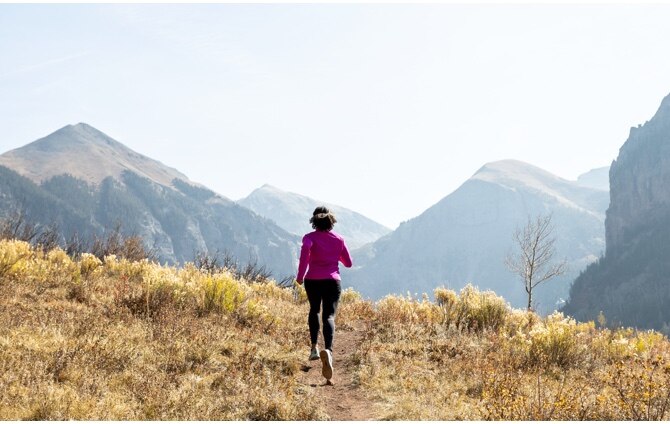
Trail running tip 1: Safety first
The first tips we can give you when you go trail running are about safety during your run
- If running alone on a trail, always tell someone where you are going and a rough time window of your run. Trails often have spotty or no phone reception, so it’s good common sense to let others know your plans.
- Read trail reviews in advance on hiking sites or apps like AllTrails. This can help preview trail surface conditions and avoid surprises like closed trailheads or downed trees due to storms. Users contribute helpful details so you can prepare for specific weather conditions, wildlife (both flora and fauna), and even permits and parking. These resources offer a general sense of how busy the trail is and if it meets your difficulty level. If you notice a trail hasn’t been reviewed in a long time, that may indicate an area to avoid.
- A good tip when you go trail running is taking a picture or screenshot of the trail map before the run, so you don’t have to rely on cell service.
- Be friendly to other trail users and politely announce you’re passing from 10+ yards away. Making your presence known is a courtesy, but it’s also good safety — doing so can help you avoid potential conflict. After all, no one likes being snuck up on.
- Running on trails generally takes longer than running on roads, and sometimes you’ll be out for much longer than you expect. Having essentials like water and proper gear will ensure you’ll be safe no matter the conditions.

Trail running tip 2: It's all about the run
When you are curious about how to start trail running, it is important to focus on the run. Here are some tips and tricks:
- An important tip when you go trail running is to respect the trail and the land it runs through. Remember, the land you are running on was likely inhabited by indigenous people for generations. Keep your litter to yourself and leave the trail as you found it. Learning the history of the area you are running in will build an appreciation for its past and preserve its future use, too.
- It's OK to walk or hike during your trail run. Everyone does it at some point, even the runners up at the front of the pack — there's no shame in slowing down on steep inclines or whenever you need a break. After all, why get out in nature if you don’t take time to enjoy it?
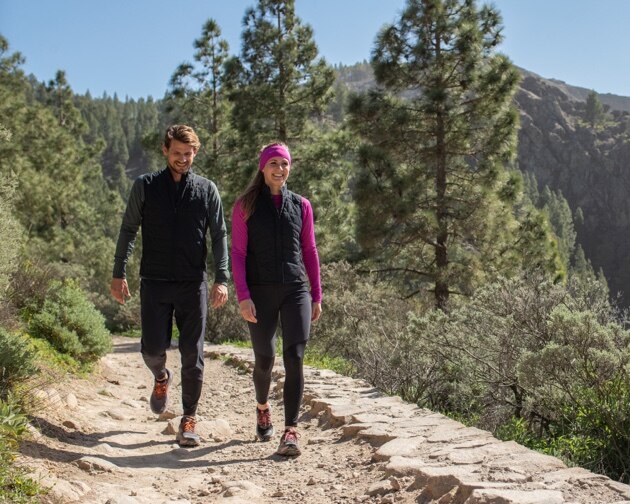
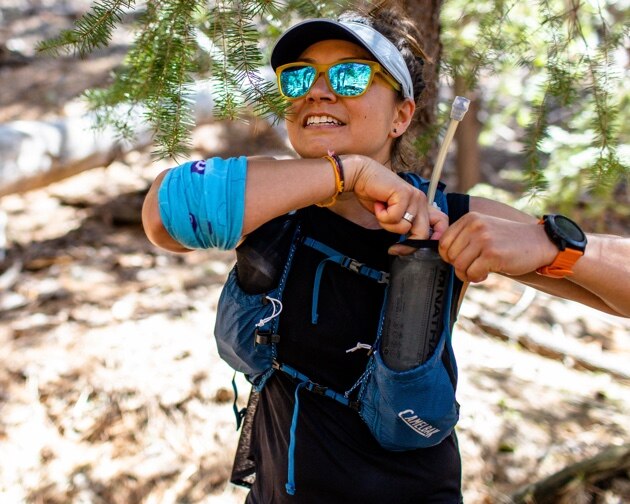
- Don't compare your trail pace to your road pace. When you run trails you can easily add 2-plus minutes to your normal ‘go-to’ comfortable pace. When you run on varied terrain, your pace is more of an average of your overall effort spent on climbs, downhills and flat sections, not hitting precise splits for every mile.
- Stability and core exercise can help with agility, which comes in handy while trying to avoid roots, rocks and puddles.
- Run with friends! New things are more fun and easier to get into when you have a buddy to share them with.

- If you’ve signed up for your first trail race, read race reports or try to find podcasts online to get advice beforehand on what to expect from the course and conditions.
- If you run with a GPS watch, you can often find .gpx files of trail-race courses to upload to your watch to make sure you are on the right path in real time. While trail-race courses are usually well marked, it’s normal to find yourself alone along the way and it’s good to know you’re headed in the right direction.
Trail running tips & tricks: what to bring on a run?
Do you need specific trail-running shoes? Yes and no. If your trail is flat and dry, your road shoes should be fine for your run. But it’s not a bad idea to invest in good trail-running shoes. They offer better traction and more protection from the elements (think slippery terrain and jagged rocks).
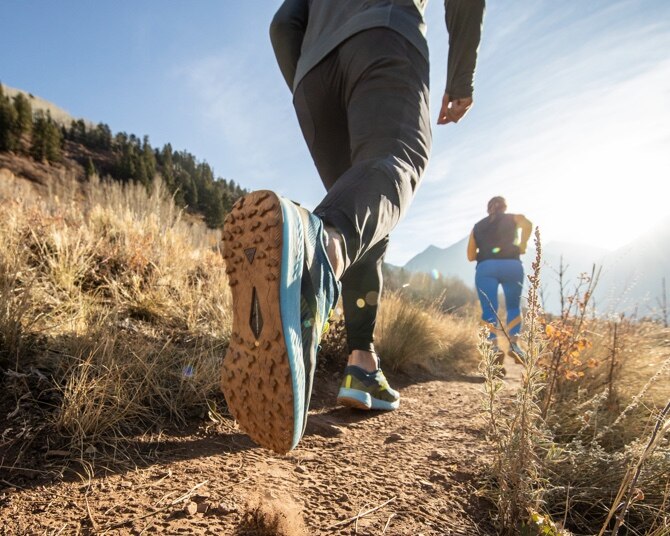
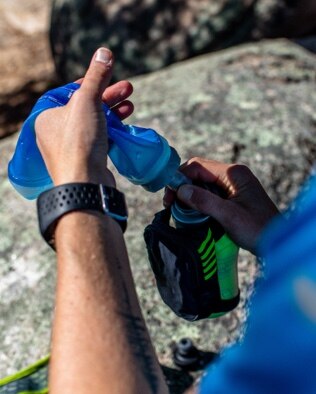

Water is essential for any run, but since trail running can take you far from the nearest water fountain, it’s best to make sure you’re well prepared with extra hydration. Consider a good hydration pack, which can come in the form of backpacks, vests, hip belts, or handheld bottles. Go to a local shop and try them on in person to find out what suits you best.
In addition to water, pack a small first aid kit, your cell phone, and easy-to-carry foods like energy bars.
Dress in layers to keep from getting too hot or cold if the weather suddenly changes. Gear like neck gaiters, arm sleeves, and bandanas are versatile — they can protect you from the sun, prickly plants, and insects and are easy to shed or tie to your pack. You can also put dip these in water in a stream or stuff them with ice at aid stations to cool off.
Trail running technique tips
If you’re new to trail running, it can be tricky to get the hang of initially as the terrain feels so different from road running. You might need to adjust the way you run slightly to compensate for the uneven ground underfoot. Luckily, we’ve got some trail running technique tips to help you out:
- Keep your eyes on the trail
It’s easy to get distracted by the beautiful scenery around you when you’re trail running but remember that there might be obstacles below your feet! To reduce the risk of falling, keep your eyes focused on the trail ahead of you. You don’t want to be looking directly down at your feet – instead, you want to focus three to four feet ahead of you. This will help you to anticipate any rocks, tree roots or uneven ground that might be coming up ahead.
- Shorten your stride
Even when you keep your gaze ahead of you, it’s likely you’ll still encounter obstacles underfoot – it’s just the nature of the trails. But shortening your stride length will ensure you stay agile and can help you to react more quickly to whatever you come across on the trail.
- Relax your shoulders
You might feel tense when running on new terrain but hunching your shoulders won’t help you. Relax your shoulders, roll them back, and lean forward slightly as you run. This will help your body to stay loose, enabling you to react more easily to obstacles in your way, and ensure you’re giving your lungs plenty of inflation space so you can breathe deeply.
Have you taken all the trail running tips? Get out on the trail
Trail running does not have to be intimidating. Do it at your own pace, take the above trail running tips with you and enjoy the beauty of nature.
Now that you have a good collection of trail running tips for beginners in your back pocket, check out this this article that features some pearls of wisdom that will help you get started if you are new to running in general. Explore more running tips, advice, workouts, and stories on the Run Happy Blog.
